In the News | 2019
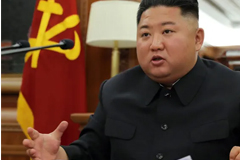 |
In the NewsDecember 30, 2019North Korea’s improved missile systems spark ‘deadline’ concernsEdward WhiteFinancial TimesVipin Narang quoted: Vipin Narang, a nuclear policy expert at MIT, said advancements across “mobility, survivability, reliability [and] penetrability” were a “nightmare” for missile defence systems across the region. “All of this has happened under the cover of this long-range missile moratorium . . . North Korea is developing both elegant and brute force ways to beat missile defences.” |
 |
In the NewsDecember 25, 2019Book Review: Active Defense: China’s Military Strategy since1949Suyash Desai Strategic AnalysisBook review of Taylor Fravel's latest book, Active Defense: China’s Military Strategy since 1949, the book fills a major gap in the study of the Chinese military strategy since 1949. |
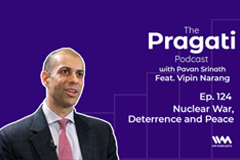 |
In the NewsDecember 25, 2019Ep 124: Nuclear war, deterrence and peacePavan SrinathThe Pragati PodcastVipin Narang joins Pavan Srinath on Episode 124 of The Pragati Podcast to dive into the world of nuclear weapons and strategy. He shares the evolution of our understanding of nuclear strategy from early ideas of mutually assured destruction. |
 |
In the NewsDecember 24, 2019A look at the fallout from the Jamal Khashoggi case in Saudi ArabiaAri ShapiroNPR | All Things ConsideredNPR's Ari Shapiro speaks with Hala Aldosari, Saudi human rights activist and fellow at the MIT Center for International Studies, about the fallout from the Jamal Khashoggi case in Saudi Arabia. |
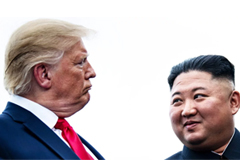 |
In the NewsDecember 23, 2019Weakened and unstable Trump gives Korea the jittersDonald KirkDaily BeastVipin Narang quoted: “Reversible steps are being reversed, and North Korea is essentially ‘renuclearizing,’” says Vipin Narang at MIT. Narang says the latest tests of launch facilities at the Sohae site near the Chinese border are “for the development of a new strategic system” even though the site had been “cosmetically dismantled as a “denuclearization step.’” |
 |
In the NewsDecember 22, 2019Jeanne Guillemin, who exposed Soviet anthrax lab, dies at 76Katharine Q “Kit” SeelyeNew York TimesJeanne Guillemin, an eminent medical anthropologist and scientific sleuth who helped expose a secret biological warfare lab in the Soviet Union as the source of a lethal anthrax outbreak, died on Nov 15 at her home in Cambridge, Mass. |
 |
In the NewsDecember 19, 2019Special Duty, "Best of Books 2019" by Foreign AffairsForeign AffairsRichard Samuels’s Special Duty, an engrossing history of Japanese intelligence, was selected by Foreign Affairs editors and book reviewers as "The Best of Books for 2019." An excerpt of Special Duty: A History of the Japanese Intelligence Community is featured here in the Center’s newsletter précis.
|
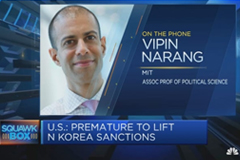 |
In the NewsDecember 18, 2019Kim Jong Un may have faced ‘domestic hard line pressure’CNBCVipin Narang spoke to CNBC and said China and Russia could have agreed to let Kim Jong Un to test missiles, but not nuclear weapons. North Korea is “waves away” from reopening nuclear testing, he said. |
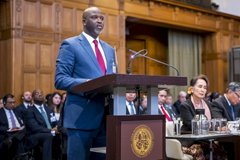 |
In the NewsDecember 18, 2019Africa insiders: Tiny Gambia stands up for the RohingyaAfrica Insiders | Shola LawalAfrican ArgumentsA case of alleged genocide brought against Myanmar by The Gambia in defence of the Rohingya people was heard last week. The Gambia’s Justice Minister Abubacarr Tambadou led the delegation at the International Court of Justice (ICJ) in The Hague while Myanmar leader, Aung San Suu Kyi, spoke for Myanmar. |
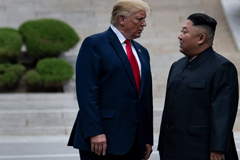 |
In the NewsDecember 18, 2019North Korea could gift the US a long-range missile for Christmas, MIT professor saysGrace ShaoCNBCVipin Narang, associate professor of political science at MIT, told CNBC’s “Squawk Box” that North Korean leader Kim Jong Un has been sending a message to US President Donald Trump as Pyongyang tested more short-range missiles throughout the summer and fall than in any other year in its history. |
 |
In the NewsDecember 17, 2019Shola Lawal on human rights and social justiceShola Lawal, the Center's Elizabeth Neuffer Fellow, discusses her work as a journalist in Nigeria, her reportage last spring on Boko Haram, and her recent trip to Mexico to investigate the migrant crisis. |
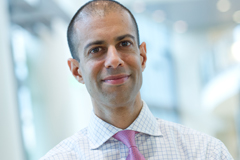 |
In the NewsDecember 17, 2019All things policy: talking nukes with Vipin NarangAditya Ramanathan and Pranav RSThe Takshashila InstitutionIn this podcast, Aditya Ramanathan and Pranav RS talk to Vipin Narang, Associate Professor at MIT about India’s counterforce temptations and the latest nuclear tensions in northeast Asia. |
 |
In the NewsDecember 16, 2019The uncertain role of natural gas in the transition to clean energyDavid L ChandlerMIT NewsA new MIT study, funded in part by The Policy Lab at CIS, examines the opposing roles of natural gas in the battle against climate change — as a bridge toward a lower-emissions future, but also a contributor to greenhouse gas emissions. |
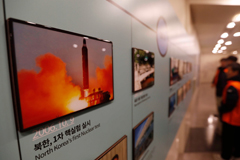 |
In the NewsDecember 14, 2019North Korea conducts ‘crucial test’ as deadline nearsWilliam GalloVOA NewsVipin Narang quoted: "The language pushes us back to an ICBM [intercontinental ballistic missile] test in the new year, maybe as the leadoff hitter," said Vipin Narang, a nuclear specialist at MIT. Given the Korean Central News Agency’s wording, Narang says the latest test almost certainly involved an engine for a long-range missile, possibly an ICBM. |
 |
In the NewsDecember 11, 2019Jeanne Guillemin, pioneering researcher who uncovered a Cold War secret, dies at 76Emily Langer The Washington PostDr Guillemin, who has died at 76, spearheaded the fieldwork revealing the anthrax outbreak in Sverdlovsk and became a sought-after analyst of biological warfare, blending anthropology, sociology and security studies into a distinctive expertise in a field where men had long outnumbered their female colleagues. |
 |
In the NewsDecember 9, 2019Richard Samuels on "Special Duty"Jeffrey MeadAsia TodayThis broadcast of Asia Today, Jeffrey Bingham Mead welcomed Professor Richard J Samuels. The conversation focused on his newly-released book Special Duty: A History of the Japanese Intelligence Community. |
 |
In the NewsDecember 7, 2019Trump says Kim Jong Un risks losing 'everything' after North Korea claims major testSoyoung Kim, Josh SmithReutersVipin Narang quoted: “If it is indeed a static engine test for a new solid or liquid fuel missile, it is yet another loud signal that the door for diplomacy is quickly slamming, if it isn’t already,” said Vipin Narang. “This could be a very credible signal of what might await the world after the New Year.” |
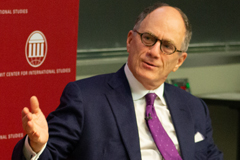 |
In the NewsDecember 6, 2019Dueling investigations? Days before inspector general's report on FBI's Russia investigation, Trump promotes AG probeKevin Johnson, Kristine PhillipsUSA TodayJoel Brenner quoted: "The modus operandi of this administration is that when they cannot dismiss somebody else's fact-based conclusions, they create a parallel narrative," said Joel Brenner, a former inspector general at the National Security Agency in the George W Bush administration. "What we are seeing here is the creation of a parallel narrative to satisfy the president's base of support," Brenner said. "It's very sad." |
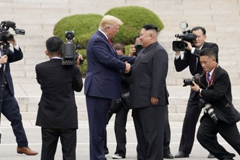 |
In the NewsDecember 5, 2019North Korean missile and Kim Jong-un's 'Christmas gift' decisionLaura BickerBBC NewsVipin Narang quoted: "All of the missiles have several things in common. They are solid fuel, they are mobile, they are fast, they fly low, and at least the KN-23 can manoeuvre inflight, which is very impressive. Any one of the missiles would pose a challenge to regional and ROK missile defences given these characteristics. Together, they pose a nightmare." |
 |
In the NewsDecember 4, 2019New images of Kim Jong Un’s horseback ride at a sacred mountain suggest the country’s promised ‘Christmas gift’ will defy TrumpEllen IoanesBusiness InsiderVipin Narang quoted: “It’s not implausible that they could give the world a Christmas or New Year gift of an ICBM test. It’s possible this is all aimed at generating pressure and leverage against Trump now, but by the same token, given the consistency and insistence on the deadline, and North Korea’s history of doing what it says it is going to do… let’s see what gift we get,” Narang said. |
 |
In the NewsDecember 3, 2019NATO summit begins amid tensionsRobin YoungWBUR Here & NowRobin Young gets the latest from security analyst Jim Walsh on the 70th anniversary gathering of NATO counterparts in London. |
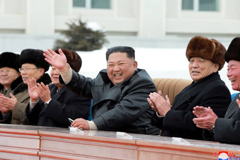 |
In the NewsDecember 3, 2019North Korea warns it's up to the US to decide what 'Christmas gift' it will getJesse JohnsonThe Japan TimesVipin Narang quoted: “Maybe the end of the year deadline was the rope Kim was given to see if Trump could deliver fruit,” said Vipin Narang, a North Korea expert and professor of international relations at MIT. “And then if not: the new way. Which is the old way with ICBMs.” |
 |
In the NewsDecember 2, 2019Saudi Arabia embraces western sports to rehabilitate global imageAlan RappeportThe New York TimesHala Aldosari quoted: “I see all of this more as a way for the government to generate revenues from things other than oil than a genuine effort by the government to grant freedom,” said Hala Aldosari, a Saudi scholar at the Massachusetts Institute of Technology. |
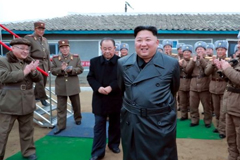 |
In the NewsNovember 30, 2019North Korea threatens Japan with 'real ballistic missile'BBC NewsVipin Narang quoted: "The North Koreans are playing a semantics game, basically, and by the same token so is Abe. When he said ballistic missile he's clearly trying to signify these tests are a violation of UN Security Council resolutions," he told the BBC. |
 |
In the NewsNovember 29, 2019Intelligence reforms: time for a Japanese James BondPeter Tasker, Arcus ResearchJapan ForwardRichard Samuels new book, Special Duty: A History of the Japanese Intelligence Community, is compared to Ian Fleming's James Bond spy novels and what the capacity is and has been for the Japanese intelligence community. |
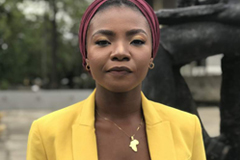 |
In the NewsNovember 25, 2019Shola Lawal and others win big at TFAA 2019Olamide AyeniPulse.ngCIS Neuffer fellow, Shola Lawal, won The Future Awards Africa (TFAA) Prize For Journalism. For thirteen years, The Future Awards Africa has been a catalyst towards building a new tribe of citizens who are bound by their potentials, relentless, hard work and united by their soaring achievements. |
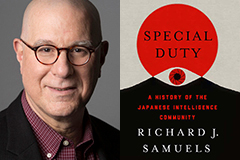 |
In the NewsNovember 23, 2019BOOK REVIEW | ‘Special Duty: A History of the Japanese Intelligence Community’ by Richard J SamuelsJune Teufel DreyerJapan ForwardAuthor Richard J Samuels, director of the Center for International Studies at the Massachusetts Institute of Technology, has combined his impressive knowledge of Japanese history with a deep understanding of intelligence operations to produce this critical yet sympathetic treatment of Japan’s intelligence community. |
 |
In the NewsNovember 20, 2019SMA debate: Why shouldn’t South Korea pay more for its defense?Doug BandowThe National InterestVipin Narang quoted: The Massachusetts Institute of Technology’s Vipin Narang tweeted: “Nothing says I love you like a shakedown.” |
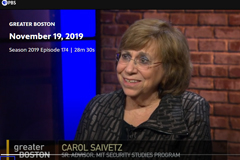 |
In the NewsNovember 19, 2019Greater Boston: Vindman testifies about Trump's Zelensky call and Volker revises his testimonyWGBH Greater BostonCarol Saivetz, senior advisor at MIT’s Security Studies Program, joins Jim Braude on Greater Boston to discuss the latest developments with the impeachment hearings and recent testimony from top Ukraine expert Lt Col Alexander Vindman, Vice President Pence adviser Jennifer Williams, National Security Council official Tim Morrison, and former special Ukraine envoy Kurt Volker. |
 |
In the NewsNovember 19, 2019Lamborghini and MIT pave the way for the electric supercar of the futureMIT NewsSerenella Sferza, MIT-Italy Program co-director, praises the MIT-Italy-Lamborghini partnership as a perfect example of how MISTI opens avenues for research and innovation that include meaningful student experiences. |
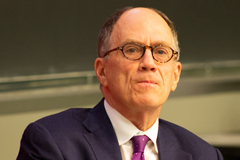 |
In the NewsNovember 19, 2019Impeachment spotlights vulnerability of acting federal watchdogsMichaela RossBloomberg GovernmentJoel Brenner quoted: “We now have an administration that’s deeply hostile to the civil service in general and to anybody who can second guess anything that they might do, lawful or unlawful,” Brenner said. “So these are important positions, especially important to fill now.” |
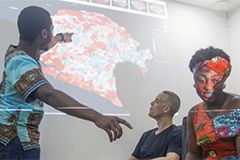 |
In the NewsNovember 18, 2019Expanding education: From Africa to Cambridge and back againLaura CarterMIT School of ScienceFor Mgcini "Keith" Phuthi ’19, spending a summer in Africa through MISTI's MIT Africa Program was more than a trip back to his home continent after graduation. It was an opportunity to directly impact national policy regarding education in the country of Sierra Leone. |
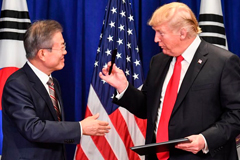 |
In the NewsNovember 18, 2019Trump and South Korea: ‘Nothing says I love you like a shakedown’Steve BenenMSNBCVipin Narang, an associate professor at MIT who follows the Korean peninsula, summarizing South Korean uncertainty about the US, was quoted saying, “Nothing says I love you like a shakedown.” |
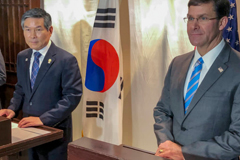 |
In the NewsNovember 17, 2019Washington and Seoul postpone military drills in bid to boost stalled diplomacy with PyongyangJesse JohnsonThe Japan TimesVipin Narang quoted: “Kim may see this as weakness, a Trump desperate to get a deal,” he said. “That may lead him to harden his position or miscalculate, on the belief that Trump wants and needs the perception of a ‘win’ more than Kim does. So even if this increases the odds of a working-level meeting, it may decrease the odds of an actual deal.” |
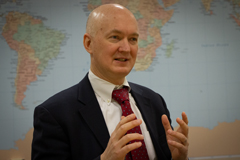 |
In the NewsNovember 15, 2019Heginbotham speaks about war games at inaugural Applied IR Speaker SeriesMatthew McGovernThe Tufts DailyResearch scientist and specialist in Asian security issues Eric Heginbotham spoke at the Cheryl Chase Center in the first installment of the international relations (IR) department’s Applied IR Speaker Series. His talk was focused around wargaming and war simulation, which have developed into integral tools in modern warfare. |
 |
In the NewsNovember 12, 2019Abe's mission unaccomplished: pushing to revise Japan's pacifist charterLinda SiegReuters“There is not much left of the post-war constraints. It was under his (Abe’s) administration where the fastest progress was achieved to get more distance from Article 9,” said Richard Samuels, who is heavily quoted in this article. |
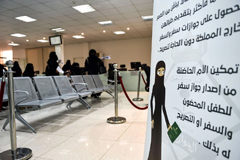 |
In the NewsNovember 12, 2019Saudi Arabia listed feminism, atheism, and homosexuality as forms of extremism. Then they (sort of) took it back.Miriam Berger The Washington PostHala Aldosari quoted: “It’s trying to reshape the regulations and laws inside Saudi Arabia in a way to control public movements,” she said. “The whole idea is trying to control the narrative, making sure that feminism is owned by the state or the agenda-setting power is in the hands of the leadership rather than the women’s activists." |
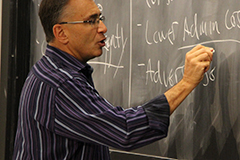 |
In the NewsNovember 7, 2019The importance of academics engaging with policymakersMIT NewsJonathan Gruber, professor of economic, cites the importance of initiatives like the MIT Policy Lab, which helps academics focus their energy on influencing public policy. |
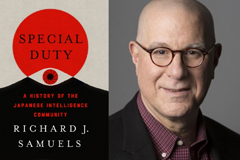 |
In the NewsNovember 7, 2019Foreign Affairs reviews “Special Duty”Andrew NathanForeign AffairsThis engrossing history of Japanese intelligence demonstrates how such changes have made Japan a better security partner for the United States while preparing the country to stand on its own if the US security guarantee loses its credibility. |
 |
In the NewsNovember 7, 2019An interview with Dr Scott Sagan and Dr Vipin NarangConversations on Peaceful ChangeConversations on Peaceful Change is a series of interviews initiated by the Global Research Network on Peaceful Change (GRENPEC). On this occasion, Dr TV Paul, the Founding Director of GRENPEC and the James McGill Professor of International Relations at McGill University, interviews Dr Scott Sagan, Caroline SG Munro Professor of Political Science at Stanford University, and Dr Vipin Narang, Associate Professor of Political Science at MIT on the future of nuclear order. |
 |
In the NewsNovember 5, 2019Over 1,000 MIT students, researchers to India in last two decadesNews18A recent event organized by the Indian Embassy highlighted the activities of the MIT-India Program and discussed a path forward to achieve greater collaboration with MIT to meet future science and technology goals in India. |
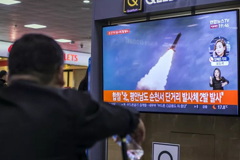 |
In the NewsOctober 31, 2019Kim Jong Un is pushing his own 'maximum pressure' campaign against Donald Trump with latest missile test, experts sayDavid BrennanNewsweekVipin Narang quoted: Narang said he would not expect to see any of these tested before the end of 2019. "It's better for Kim just to let the clock run out and then see what happens at the end of the year," he suggested. But after that, "all bets are off." |
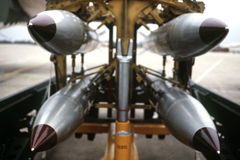 |
In the NewsOctober 25, 2019Could someone actually steal a US nuke?Joe PappalardoPopular MechanicsVipin Narang quoted: “There are risks when you move things,” says Narang. “They're actually probably more secure in the vaults at the moment. The US is kind of caught between a rock and a hard place. We should've moved them out a long time ago, but moving them now is probably riskier than just keeping them in the vault.” |
 |
In the NewsOctober 24, 2019Picture from Washington: Not so rosy on KashmirAnita JoshuaThe TelegraphVipin Narang quoted: “The US Congress’s concerns are intense, and not going away. This isn’t just a liberal media creation,” he said. On Monday, foreign minister S Jaishankar had blamed the “English-speaking liberal media” for unfair reporting on the changes made to Article 370. |
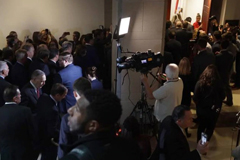 |
In the NewsOctober 24, 2019The Cybersecurity 202: SCIF fight shows lawmakers can be their own biggest cybersecurity vulnerabilityJoseph MarksThe Washington PostJoel Brenner quoted: “If people in Congress who make the laws don’t follow the rules, why should anybody else?” Joel Brenner, former head of US counterintelligence during the Obama administration, told me. “Foreign intelligence agencies make a living off people who think they’re too important to follow rules like this.” |
 |
In the NewsOctober 21, 2019At the Center for International Studies, a student endowment for women in international affairsCenter for International StudiesMIT NewsEstablished by distinguished sociologist Jeanne Guillemin, the endowment will provide financial support for women at MIT pursuing a PhD in international affairs. |
 |
In the NewsOctober 17, 20193 Questions: Historian Elizabeth Wood on election interferenceSchool of Humanities, Arts, and Social Sciences MIT NewsHow do we understand Russia’s multi-layered interference in the 2016 elections? Elizabeth Wood, Russia expert and professor of history analyzes Russia’s motives. |
 |
In the NewsOctober 16, 2019North Korean leader visits sacred mountain as speculation grows of fresh provocationJesse JohnsonThe Japan TimesVipin Narang quoted: “Don’t get me wrong I was hoping for a shirtless KJU in the snow as much as the next person … but I think he’s giving us a space launch instead.” Narang told The Japan Times that an ICBM launch or nuclear test were “too aggressive, too soon,” but that a rocket launch, likely under the veneer of putting a satellite in space, would be a possible option for Kim. |
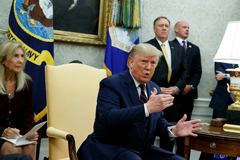 |
In the NewsOctober 16, 2019Trump appears to confirm US nukes are in Turkey, an admission that would break with longstanding protocolAaron BlakeThe Washington PostVipin Narang quoted: “Incirlik is Turkey’s air base, not ours,” Narang said. “And that is essentially the problem. We store these nuclear weapons in secure vaults on a Turkish air base, where we either have to secure them under the present circumstances, or bring transport aircraft to the base, move them on a Turkish air base and then fly them out of Turkish airspace if we wanted to extract them. Under the present circumstances, that is not a simple logistical or security feat.” |
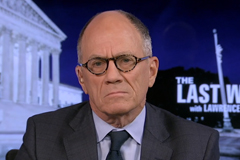 |
In the NewsOctober 15, 2019Former inspector general on Trump & republicans attacking the whistleblowerMSNBCThe Last Word with Lawrence O'DonnellPresident Trump is demanding the whistleblower whose complaint led to the current impeachment inquiry be revealed. Lawrence O'Donnell talks to Joel Brenner about why the law protects a whistleblower's right to anonymity and what Trump's attacks could mean for future whistleblowers. |
 |
In the NewsOctober 15, 2019Tests and temptations: The nuclear balance in AsiaCATOVipin Narang of the MIT Department of Political Science joins Trevor Thrall and guest host Eric Gomez to discuss nuclear trends and the nuclear balance in Asia. |
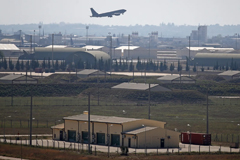 |
In the NewsOctober 14, 2019US nuclear bombs at Turkish airbase complicate rift over Syria invasionJulian Borger and Jennifer RankinThe GuardianVipin Narang quoted: Removing the weapons would not be straightforward. “Extracting them under these circumstances may be incredibly risky since it would involve removing 50 nuclear weapons from the vaults, moving them on a Turkish base and flying them out of Turkish airspace,” Narang said. “They could be vulnerable to accidents, theft or attack.” |
 |
In the NewsOctober 8, 2019A look at Japan’s evolving intelligence effortsPeter DizikesMIT NewsA new book, by MIT political scientist Richard Samuels, examines the past and future of Japanese intelligence services in a rapidly shifting world. |
 |
In the NewsOctober 6, 2019North Korea doubts US will have alternative plans inside two weeksJu-min Park, Josh SmithReutersVipin Narang quoted in Reuters: Vipin Narang added that North Korea is also buying time to continue to expand and improve its missile and nuclear force, and negotiate the terms by which it is accepted as a nuclear weapons power. “If that’s the case, their best strategy is to dangle the hope of a fictional future deal but stall on actual negotiations, let alone crafting or implementing any such deal,” Narang said. |
 |
In the NewsOctober 5, 2019Opening the arsenalThe EconomistOwen Cote quoted: The jl-2 does not have the range of the DF-41. It could "at best attack Seattle" says Owen Cote of the Massachusetts Institute of Technology, because the noisy Jin-class subs would struggle to range beyond the Yellow Sea without being detected. But China is developing new missiles and subs to remedy this. |
 |
In the NewsOctober 4, 2019North Korea escalates missile testsPeter O'DowdWBUR Here & NowThis week, North Korea confirmed it test-fired a new type of a ballistic missile, a significant escalation from the short-range tests it has conducted since May. Jim Walsh speaks with Here & Now about what the new tests and escalations might mean. |
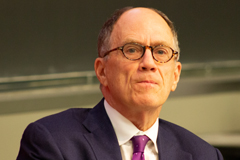 |
In the NewsOctober 3, 2019Group of former intelligence community watchdogs call for protecting whistleblowersProject on Government Oversight (POGO)A group of former intelligence community inspectors general, including Joel Brenner, former inspector general at the National Security Agency, have signed an open letter calling on Congress to protect the whistleblower from retaliation and unwarranted attacks, while also supporting Atkinson’s handling of the situation. |
 |
In the NewsOctober 2, 2019One year on, shadow of Khashoggi’s killing stalks Saudi princeBen HubbardThe New York TimesWilhelm Fellow Hala Aldosari quoted: “Khashoggi is always going to be a stain on Mohammed bin Salman,” said Hala Aldosari, a Saudi scholar and fellow at the MIT Center for International Studies. “It is not going to go away.” |
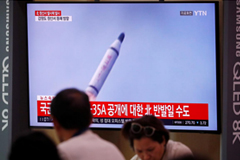 |
In the NewsOctober 1, 2019North Korea fires ballistic missile, possibly from submarine, days before talksJoyce Lee, Chang-Ran KimReutersVipin Narang quoted: “The risk is that testing such a system causes the US to walk away before this weekend, but Kim probably bet that the US is so invested in the talks taking place and making progress ... that the US won’t walk away.” |
 |
In the NewsSeptember 30, 2019Former NSA inspector: whistleblower does not need firsthand informationMeghna ChakrabartiWBUR On PointJoel Brenner spoke with On Point about the whistleblower complaint, "I think everybody in the intelligence community is extremely nervous. The president's been attacking the community, explicitly." |
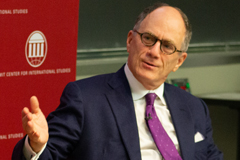 |
In the NewsSeptember 28, 2019A brief history of intelligence whistleblowingGreg MyreNPRJoel Brenner interviewed by NPR: As inspector general at the NSA in the early 2000s, Joel Brenner says he was allowed to operate independently and tackle sensitive issues. But he says it's also important to look into the motives of the whistleblower. |
 |
In the NewsSeptember 27, 2019Joel Brenner: allegations that WH attempted to cover up Trump-Ukraine call records is "deeply troubling"MSNBCJoel Brenner, the former Inspector General of the NSA, said that if someone covered up information for personal gain during his time in the Bush Admin, they would've been "frog marched out of the building." |
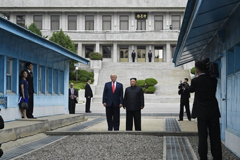 |
In the NewsSeptember 25, 2019From focus to forgotten: Why no N Korea spotlight at UN?Foster KlugAP NewsVipin Narang quoted in AP: “Incentives align on both sides,” Narang said. “That makes me think the low-key mention of North Korea, and the emphasis on Iran, was designed to keep the window wide open for working-level talks.” |
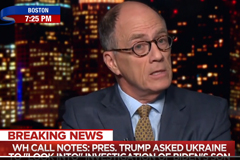 |
In the NewsSeptember 25, 2019GOP lawmakers invited to WH todayChris MatthewsMSNBC HardballJoel Brenner interviewed on Hardball with Chris Matthews: I wanted to tell people who were focused on this quid pro quo business, about which people are spinning whichever way they want to, to focus instead on the sequence of events. |
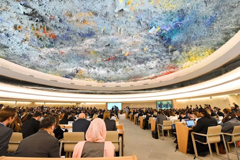 |
In the NewsSeptember 23, 2019Saudi Arabia again under UN scrutiny as anniversary of Khashoggi killing nearsZoe ToddFrontline PBSWilhelm fellow Hala Al-Dosari quoted: “It’s a good signal, basically, on a change in attitudes toward people and it really punctures this kind of narrative on modernization that Mohammad bin Salman is trying to convey — that he’s a new modernizer who is actually not bringing Vision 2030 as an economic reform. He’s bringing his shackles, you know, his family’s shackles and swords along with him.” |
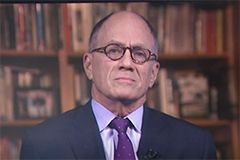 |
In the NewsSeptember 21, 2019Why whistleblower standoff represents a ‘unique juncture’ for US governmentPBS NewshourJudy Woodruff talks to Joel Brenner, who was the National Security Agency’s inspector general under President George W Bush, about why he expects Congress to investigate further. |
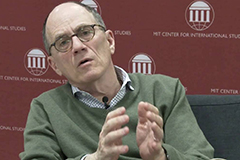 |
In the NewsSeptember 20, 2019Joel Brenner on whistleblower & TrumpMSNBCJoel Brenner, the former Inspector General for the National Security Agency, discusses the efforts of IG Michael Atkinson to protect the whistleblower- and what he thinks is an interesting and relevant lawsuit filed today by Trump's legal team. |
 |
In the NewsSeptember 20, 2019Joel Brenner comments on whistleblower issueNPR NewsFormer NSA official Joel Brenner over how the acting director of National Intelligence and the Intelligence Community Inspector General handled a whistleblower complaint. |
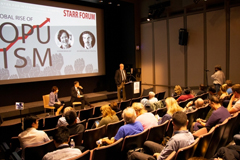 |
In the NewsSeptember 16, 2019Understanding populismPeter DizikesMIT NewsRichard Samuels, Suzanne Berger and Jan-Werner Mueller examined the issue of populism at the MIT CIS Starr Forum on Thursday, discussing the key hallmarks of populism, as well as its relationship to global economics. |
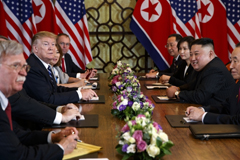 |
In the NewsSeptember 15, 2019With new North Korea-US talks likely, will a deal result?Christy LeeVOA NewsNarang quoted: Vipin Narang said Trump might “blame [the outgoing National Security Adviser John] Bolton for the Hanoi hold-up, and reset America’s negotiating position toward a step-by-step deal, comprehensive in scope but implemented in phases.” |
 |
In the NewsSeptember 12, 2019Japanese spies, once renowned, have fallen on hard timesThe Economist features Richard Samuels new book, “Special Duty: A History of the Japanese Intelligence Community.” |
 |
In the NewsSeptember 12, 2019A look at US national security after Bolton's departureJeremy HobsonWBUR Here & NowPresident Trump abruptly canceled peace talks with the Taliban at Camp David and then fired his national security adviser, John Bolton, who opposed hosting the Taliban. Host Jeremy Hobson speaks with security analyst Jim Walsh about President Trump's latest decisions and what it might mean. |
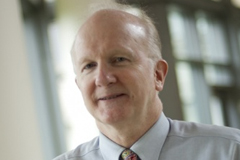 |
In the NewsSeptember 12, 2019Victim ideology part 1Jay Talking podcastStephen Van Evera talks about how bad things happen when the powers the be employ victim ideology in this podcast. |
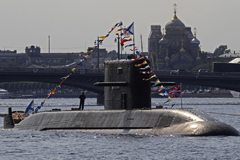 |
In the NewsSeptember 6, 2019The Russian Navy: A submarine powerhouse?David AxeThe National InterestOwen Cote quoted: “We shouldn’t be surprised if the Russians get some money together so that they can build some submarines like they were building at the end of the Cold War,” Cote said. “But what always happens with them, and what happened at the end of the Cold War too, is that they don’t really have the money.” |
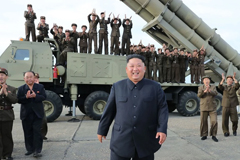 |
In the NewsSeptember 2, 2019North Korea missile tests, ‘very standard’ to Trump, show signs of advancing arsenalDavid E Sanger and William J BroadThe New York TimesVipin Narang quoted: “Kim understands what he is doing. He likely thinks Trump can live with a nuclear North Korea as long as they don’t test ICBMs and nuclear weapons, which would humiliate Trump and take away the perception he has achieved of some kind of victory” with his diplomacy. |
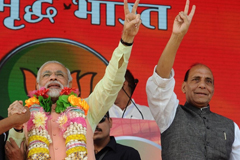 |
In the NewsAugust 30, 2019Is India “creatively reinterpreting” its no-first-use policy?John KrzyzaniakBulletin of the Atomic ScientistsQuoted: India’s solution, Clary and Narang argue, has been to develop a “counterforce” capability that would give India the option to target Pakistan’s nuclear forces rather than its population centers. |
 |
In the NewsAugust 30, 2019M Taylor Fravel, Active Defense: China’s Military Strategy since 1949Andrew S EricksonJournal of Chinese Political ScienceBook review of M Taylor Fravel's latest book, Active Defense: China’s Military Strategy since 1949. |
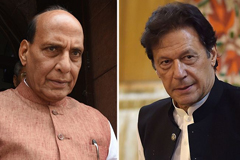 |
In the NewsAugust 29, 2019India–Pakistan nuclear escalation: where could it lead?Priyanka PullaNatureVipin Narang quoted: For example, if India firms up the change in its no first use policy, Pakistan might take this as a signal that India could pre-emptively strike at Pakistani nuclear installations, says Narang. And that might, in turn, prompt Pakistan to use up all its nuclear weapons first. “And so, you get this destabilising dynamic where as soon as the crisis becomes nuclearized, there is an incentive for both sides to go first.” |
 |
In the NewsAugust 28, 2019A nuclear world with Vipin NarangSrinath RaghavanInterpreting IndiaSrinath Raghavan sits down with Vipin Narang to discuss India's evolving nuclear strategy and the impact of nuclear weapons around the world. |
 |
In the NewsAugust 25, 2019Watch | ‘No First Use’ in India’s Nuclear DoctrineHappymon JacobThe WireHappymon Jacob speaks to Vipin Narang about the status of India’s 'No First Use' nuclear policy in the light of defence minister Rajnath Singh’s statement. |
 |
In the NewsAugust 23, 2019Relaunched: The new nuclear arms race with RussiaFox News RadioA mysterious explosion in Northern Russia is causing concern that the nation may be testing new nuclear weapons. Jim Walsh discusses whether the world should be worried and if this is the start of a new nuclear arms race in this Fox News podcast. |
 |
In the NewsAugust 21, 2019Disbelief, joy and resistance as Saudi women get first passportsVivian Nereim and Sarah Algethami BloombergWilhelm Fellow Hala Al-Dosari quoted: Women who go against their families could potentially face legal charges from their guardians, something the government still needs to clarify. |
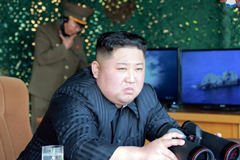 |
In the NewsAugust 20, 2019Japanese report to say North Korea has miniaturized nuclear warheadsReporting by Chris Gallagher and Linda Sieg in Tokyo, and Josh Smith in Seoul. Writing by Malcolm Foster; Editing by Simon Cameron-MooreReutersVipin Narang quoted: North Korea’s ability to build nuclear warheads small enough to fit on its ballistic missiles has been widely accepted for several years, but the Japanese report highlights the lack of progress on denuclearisation talks aimed at curtailing the program. “It is Japan that is most threatened, and probably the primary target of such a capability,” he said. “So openly acknowledging it underscores Tokyo’s acute fears that North Korea’s nuclear program continues to grow unabated with no foreseeable plan to slow its growth, let alone eliminate them.” |
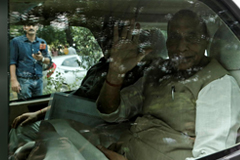 |
In the NewsAugust 16, 2019India says committed to 'no first use' of nuclear weapons for nowSanjeev MiglaniReutersVipin Narang quoted: Vipin Narang, a nuclear affairs expert at MIT in the United States, said that Singh’s comments were a sign the policy on ‘no first use’ could change in the future. “Make no mistake: this is by far the highest official statement—from the Raksha Mantri’s (Defence Minister) mouth directly—that India may not be forever bound by No First Use.” |
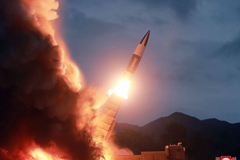 |
In the NewsAugust 15, 2019Fast, low and hard to stop: North Korea’s missile tests crank up the threat levelSimon Denyer The Washington PostVipin Narang quoted: “The three missiles have several things in common: They are solid fuel, they are mobile, they are fast, they fly low, and at least the KN-23 can maneuver in-flight, which is very impressive. Any one of the missiles would pose a challenge to regional and [South Korean] missile defenses given these characteristics. Together, they pose a nightmare.” |
 |
In the NewsAugust 14, 2019Russian scientist in city near nuclear explosion warns locals not to fish, says agency 'committed a crime'Brendan ColeNewsweekVipin Narang quoted: "It's an air-breathing cruise missile and they put an unshielded mini nuclear reactor on it...We [the US] tried this in the 1960s and gave up for a reason, and this is why. It's very risky." |
 |
In the NewsAugust 13, 2019The intersection of technology and warMichelle EnglishMIT NewsFiona Cunningham completed her PhD at the Department of Political Science, where she was also a member of the Security Studies Program. Her work explores how technology affects warfare in the post-Cold War era. She studies how nations—China specifically—plan to use technology in conflict to achieve their aims.
|
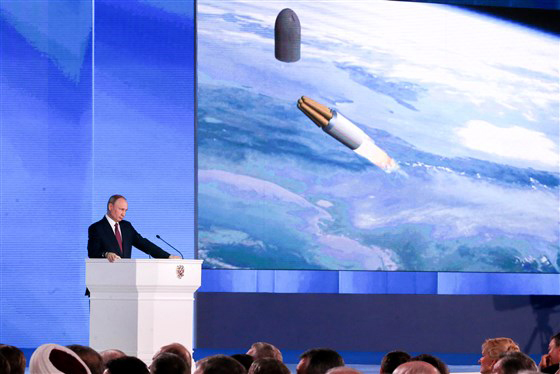 |
In the NewsAugust 13, 2019Failed Russian nuclear test hints at Putin's dangerous plans to beat US defensesAlexander SmithNBC NewsVipin Narang quoted: "There's really no other possible scenario for this. All the pieces fit together." |
 |
In the NewsAugust 13, 2019Missile test site explosion raises questions about US-Russia nuclear competitionJeremy HobsonWBUR Here & NowFive Russian nuclear engineers were killed in an explosion at a test site last week, testing a new missile, which raises important questions about the future of nuclear competition between the US and Russia. Host Jeremy Hobson speaks with with Here & Now security analyst Jim Walsh. |
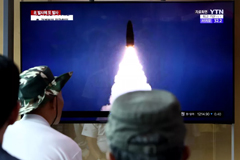 |
In the NewsAugust 12, 2019North Korea’s new weapons, and how they affect Trump’s nuclear deal hopes, explainedAlex WardVoxQuoted: “This is a nightmare for regional missile defenses,” Vipin Narang, a nuclear expert at MIT, told me. What makes the missile even deadlier is that it can be shot from a mobile launcher, which makes predicting when and where it might come from nearly impossible. |
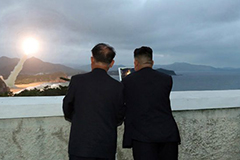 |
In the NewsAugust 11, 2019Kim Jong Un guided test-fire of new “superior tactical” weapon on Saturday: KCNADagyum Ji NK NewsVipin Narang quoted: “The whole combination of them: MLRS, KN-23, and this together are a nightmare for missile defenses.” |
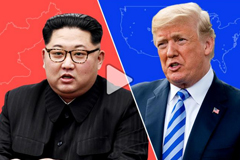 |
In the NewsAugust 10, 2019Trump says he looks forward to seeing Kim Jong Un 'in the not too distant future'Nicole Gaouette, Kylie Atwood and Jeremy DiamondCNNVipin Narang quoted: Trump's assessment of the alliance "a stark break from 70 years" of US presidential custom. "2019 is weird," Narang said. "The President has more respect for Kim Jong Un than he does for South Korea ... our formal ally." |
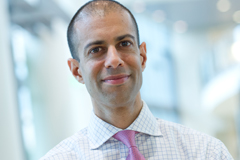 |
In the NewsAugust 9, 2019The difficulty of basing US missiles in AsiaAnthony KuhnNPR NewsWashington says the weapons would be non-nuclear and defensive in nature, but Vipin Narang says that China will not see it that way. |
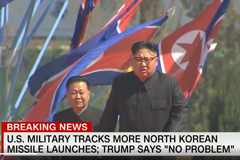 |
In the NewsAugust 2, 2019A month after G20, Trump's Asia policy achievements appear to be unravelingJoshua BerlingerCNNVipin Narang quoted: "This is a stark reminder that President Trump went to Panmunjom, shook Kim Jong Un's hand and said we're going to restart talks. And Kim Jong Un is basically saying with these tests, I need more than a handshake," Narang said. |
 |
In the NewsAugust 1, 2019AI meets bureaucratic politicsAndrew ImbrieWar on the RocksTaylor Fravel argues that the degree of party unity is central to whether and how change occurs in response to shifts in the conduct of warfare. Additional commentary on Fravel's work is cited.
|
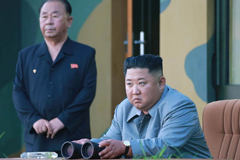 |
In the NewsJuly 31, 2019North Korea conducts second weapons test in under a weekTimothy W Martin and Andrew JeongThe Wall Street JournalQuoted: Vipin Narang said the test sends a message of frustration over the US-South Korea drill without derailing diplomacy with Mr Trump. “It’s a reminder that during this whole process, North Korea continues to improve and expand its missile and nuclear-weapons arsenal.” |
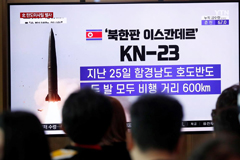 |
In the NewsJuly 31, 2019US still hopes for talks after latest North Korean missile testsJosh SmithReutersQuoted: Vipin Narang said the missile tests were part of the North Korean leader’s approach to diplomacy: “He’s saying it will take more than a photo-op to get things moving.” |
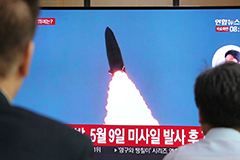 |
In the NewsJuly 25, 2019North Korean missile launch a 'new type of threat,' South Korea saysZachary Cohen, Nicole Gaouette, Sophie Jeong, Barbara StarrCNNQuoted: "Trump's trip to Panmunjom didn't have its desired effect," Vipin Narang. "There's no date for working level talks. Instead, they're still testing—Kim is touring potentially nuclear capable submarines and firing" missiles. Narang said that based on initial descriptions early Thursday, at least one of the projectiles was likely a solid-fuel ballistic missile that's been jokingly dubbed the Kimskander, a portmanteau of Kim and the Iskander missile which experts say the North Korean weapon was likely based on.
|
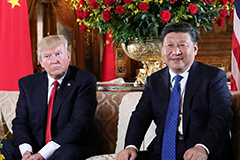 |
In the NewsJuly 25, 2019China says the US is undermining global stabilityDandan LiBloombergQuoted: This year’s white paper “was the first to be much more explicit about Chinese concerns regarding the United States,” said Taylor Fravel. “The references to the US reflect the deepening tensions and rivalry between the two countries.” |
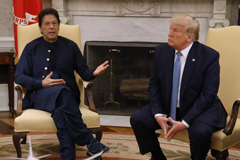 |
In the NewsJuly 24, 2019How Pakistan is playing Washington—againMichael Hirsh, Lara SeligmanForeign PolicyQuoted: “They are so good at this game—literally rope a dope,” Vipin Narang. “Their incentive is to bait and bleed the United States and extract as many goodies (at one point a nuclear arsenal) out of us as they can. And we have been baited and bled for 40 years. This is the most profitable franchise in Pakistani history.” |
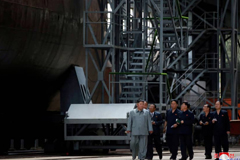 |
In the NewsJuly 23, 2019Kim Jong Un inspects submarine that experts fear could carry far-reaching missilesNick VisserHuffington PostVipin Narang, quoted in this article, said “For now these are just pics. But the fact that the KCNA release is littered with the word ‘strategic’ suggests Kim wants us to believe that is a possible SLBM.” |
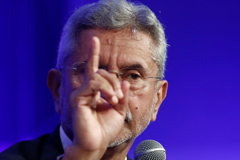 |
In the NewsJuly 23, 2019Delhi denies asking Trump to mediate Kashmir disputeSteve HermanVOA NewsQuoted: Trump not only blew past that red line, he threw masala on the wound by suggesting that Modi asked him to mediate, which is likely 1,000 percent a lie, argues Vipin Narang. With US-India relations already struggling and India’s S-400 missile purchase (from Russia), this just added fuel to the fire, he added. |
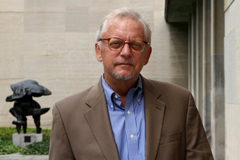 |
In the NewsJuly 22, 20193Q: John Tirman on a new US human rights commissionMichelle EnglishMIT NewsJohn Tirman, executive director and principal research scientist at MIT CIS, provides context behind the newly created commission by US Secretary of State Mike Pompeo and describes its potential impact on the human rights movement. |
 |
In the NewsJuly 19, 2019Iran denies US claims about drone attackEric WesterveltWBUR Here & NowIran denied President Trump's statement that a US warship destroyed an Iranian drone near the Persian Gulf after it threatened the ship. SSP's Jim Walsh weighs in on the new escalation of tensions between the US and Iran. |
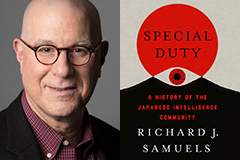 |
In the NewsJuly 16, 2019Special duty: A history of the Japanese intelligence communityIn Special Duty, Richard J Samuels dissects the fascinating history of the intelligence community in Japan. It has been cited as "a masterpiece" that offers "much needed insight to academics and policymakers." |
 |
In the NewsJuly 10, 2019Suzanne Berger named inaugural John M Deutch Institute ProfessorPeter DizikesMIT NewsPolitical scientist Suzanne Berger has been named MIT’s inaugural John M Deutch Institute Professor, joining the select group of people holding MIT’s highest faculty honor. |
 |
In the NewsJuly 9, 2019World powers react to Iran exceeding limits in nuclear dealRobin YoungWBUR Here & NowJim Walsh, MIT Securities Studies Program senior research associate, discusses Iran enriching uranium beyond the accord's 3.67% limit as tensions with Iran escalate. He speaks with Robin Young on Here & Now. |
 |
In the NewsJuly 6, 2019Hot new Japan book releases for the sweltering summerIain MaloneyThe Japan TimesRumors and secrets are at the heart of Richard J Samuels’ “Special Duty: A History of the Japanese Intelligence Community” (Cornell University Press, October). |
 |
In the NewsJuly 6, 2019Chaguan | A chained dragonThe EconomistQuoted: America’s geography is even luckier below the waves, argues Owen Cote, in a new study in the Bulletin of the Atomic Scientists. Since the cold war, he writes, America has successfully tracked foreign submarines with acoustic arrays placed where continental shelves end and deep oceans begin. Link to full text article |
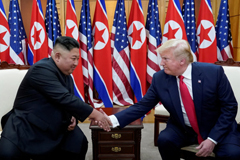 |
In the NewsJuly 4, 2019Even for a limited nuclear deal, North Korea may settle for nothing less than sanctions reliefReporting by Josh Smith; Editing by Lincoln FeastReutersVipin Narang, quoted in this article, said “A freeze on fissile material, nuclear weapons, and missile production at Yongbyon and beyond—when North Korea does not even acknowledge enrichment facilities outside Yongbyon—without some sanctions relief, seems unlikely,” |
 |
In the NewsJuly 3, 2019Trump-Kim handshake may be meaningless without bridging denuclearization differencesChristy LeeVOAVipin Narang, quoted in this article, said for the working-level talks to succeed both sides need to revise their positions going forward and agree on the definition of denuclearization and what approach to take in achieving it. |
 |
In the NewsJuly 3, 2019The IT and biological technology linkBitange NdemoBusiness Daily AfricaKen Oye spoke at The Gordon Institute of Business Science and the Georgia Institute of Technology on The Emerging to Converging Technologies Conference in Johannesburg and had many solutions that could bring great benefit to the southern hemisphere. |
 |
In the NewsJuly 3, 2019Military strategy and politics in the PRCSupChinaThe SupChina podcast featured Taylor Fravel. His new book Active Defense: China’s Military Strategy Since 1949, examines the changes to the PLA’s strategy, why they happen, and why, just as importantly, in some moments when we’d expect major changes in strategy, they don’t happen. |
 |
In the NewsJuly 1, 2019Trump steps over North Korean border and into controversial nuclear negotiationsLisa MullinsWBUR Here & NowPresident Trump traveled to the demilitarized zone between the Koreas and shook hands with Kim Jong Un in North Korean territory. Jim Walsh weighs in. |
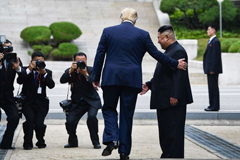 |
In the NewsJuly 1, 2019After Trump and Kim's handshake, what comes next in US-North Korean talks?: AnalysisConor FinneganABC News“I have no problem with a stunt that jolts a comatose working level process,” tweeted Vipin Narang, assistant professor at MIT, about the DMZ meeting. “But this was picking up the fifteen yards we lost at Hanoi because of Trump's own hardened maximalist position. If that doesn't change, this is just theatrics.” |
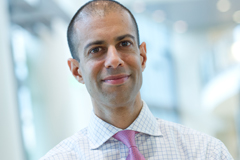 |
In the NewsJuly 1, 2019Iran says it has exceeded uranium limits set in 2015 nuclear dealGeoff BrumfielNPRVipin Narang says it appears almost inevitable that Iran will follow through and ramp up its nuclear program again, even as Washington warns it not to. |
 |
In the NewsJuly 1, 2019Trump’s whirlwind weekend in AsiaGreater Boston StaffWGBH Greater BostonCarol Saivetz and Jim Walsh, senior advisor and senior research associate, respectively, at MIT's Security Studies program, discuss President Trump’s weekend in Asia. |
 |
In the NewsJuly 1, 2019Taylor Fravel named director of the MIT Security Studies ProgramCenter for International StudiesMIT NewsTaylor Fravel takes over as director of the MIT Security Studies Program (SSP). Barry Posen will continue his research and teaching responsibilities at MIT and continue leading SSP's Grand Strategy, Security, and Statecraft Fellows Program. |
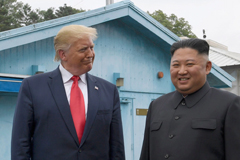 |
In the NewsJune 30, 2019The media hands Trump a hollow victory on North KoreaPeter WadeRolling StoneAs MIT security studies professor Vipin Narang pointed out on Twitter, Trump and Kim’s talks stand exactly where they were 15 months ago. The only difference is this new photo op. |
![North Korea's leader Kim Jong Un, left, and US President Donald Trump shake hands during a meeting on the southern side of the DMZ [Brendan Smialowski/AFP]](https://cis-mit-edu.ezproxy.canberra.edu.au/sites/default/files/images/News_InTheNews_063019_AmazingEventNKoreaTrumpKim.jpg) |
In the NewsJune 30, 2019‘Amazing event’: North Korea lauds Trump-Kim meeting at borderAljazeeraVipin Narang of MIT said the North was portraying Kim as “being courted by Trump”. “Note very carefully the sequence of issues here,” he said on Twitter. “Easing tensions, ending inglorious relations, and then working on denuclearisation of the Korean Peninsula (again, not just North Korea). “Kim is still not offering to unilaterally disarm.” |
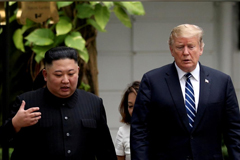 |
In the NewsJune 28, 2019Trump offers North Korea's Kim weekend meeting in demilitarized zoneRoberta Rampton, Joyce LeeReuters“The fundamental problem - no working-level meetings and no basic change in at least the US negotiating position - means that any meeting right now is just pointless theater,” tweeted Vipin Narang, an MIT professor of political science. |
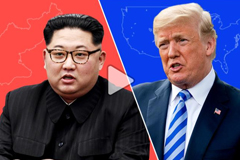 |
In the NewsJune 27, 2019North Korea denies reports of behind-the-scenes talks with US in sharp rebuttal to South Korea's MoonJoshua BerlingerCNNVipin Narang said it appears unlikely a summit is forthcoming. “My expectations are low, and I think going forward it's best to keep them there” he said, adding that it's more likely that developments will come from meetings between senior officials. |
 |
In the NewsJune 25, 2019Is Boston a cloud security hub?Tiziana Dearing and Jamie BolognaWBURBoston was chosen by Amazin to host the first conference on cloud security. But what is cloud security and why is Boston a leader in it? Joel Brenner weighs in. |
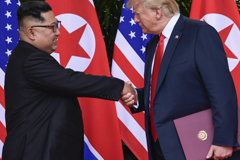 |
In the NewsJune 25, 2019Trump and Kim exchange letters, but will they meet at DMZ?William GalloVOA News“This is like the buildup to The Apprentice finale,” tweeted Vipin Narang. “A lot of intrigue and drama, but that was ultimately an extreme letdown. We actually play right into Trump’s hand by tuning in and hanging on to every word. Someone let us know how this ends.” |
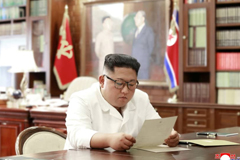 |
In the NewsJune 23, 2019Kim Jong Un receives letter from Trump, saying he will 'seriously contemplate' its 'interesting content'Jesse JohnsonThe Japan Times“Did Trump indicate a willingness to moderate the US negotiating position (good)? Or did Trump unknowingly assent to something Kim said about doing so in his own letter and now Kim thinks Trump is on board (bad)?” Vipin Narang, a North Korea expert and professor of international relations at MIT, wrote on Twitter. |
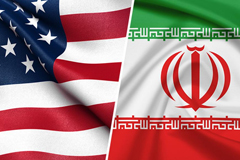 |
In the NewsJune 21, 2019What's next after Iran strike called off?Jeremy HobsonWBUR Here & NowPresident Trump confirmed Friday he rescinded a military operation to strike Iran that was underway. Host Jeremy Hobson talks with Here & Now security analyst Jim Walsh, with MIT's Security Studies Program. |
 |
In the NewsJune 19, 2019Is the US inching closer to war with Iran?Fox News RadioTensions between the US and Iran continue to escalate. Is it nothing more than saber-rattling, or is the threat of war real? Former CIA station chief Daniel Hoffman and MIT Securities Studies Program Senior Research Associate Dr Jim Walsh explain the increase in pressure. |
 |
In the NewsJune 19, 2019What would a US grand strategy of restraint look like?Elliot WaldmanWorld Politics Review: Trend LinesBarry Posen is featured on World Politics Review’s podcast to discuss his idea of a US grand strategy based on restraint and how it would look when put into practice. |
 |
In the NewsJune 14, 2019Trump blames Iran for attack on oil tankers in Gulf of OmanLisa MullinsWBUR Here & NowPresident Trump said on Friday that Iran carried out the attack on two oil tankers in the Gulf of Oman. Host Lisa Mullins talks with Here & Now security analyst Jim Walsh, with MIT's Security Studies Program. |
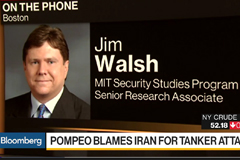 |
In the NewsJune 14, 2019We should assume Iran is responsible for attacks on oil tankers, says Jim WalshDavid Westin Bloomberg Daybreak: AmericasJim Walsh, MIT Securities Studies Program senior research associate, discusses who is responsible for the attacks on two oil tankers in the Straits of Hormuz, on Thursday. He speaks with Bloomberg’s David Westin on “Bloomberg Daybreak: Americas.” |
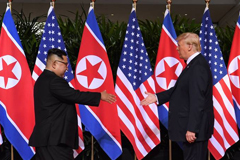 |
In the NewsJune 12, 2019‘The clock is ticking’: A year on from the Singapore summit Kim Jong Un is losing patience with Donald Trump’s strategyDavid BrennanNewsweekVipin Narang says that the collapse of talks in Hanoi has left talks "on life support." …Kim has suggested that the moratorium will only remain in place until the end of this year if the US does not soften its negotiating stance. |
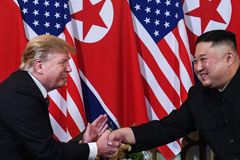 |
In the NewsJune 11, 2019As North Korea doubles down on its nuclear weapons, Trump and the US are stuck with ‘strategic patience’Rob YorkSouth China Morning PostVipin Narang, a nuclear proliferation expert at MIT, said North Korea could be convinced to freeze fissile material production and that its Yongbyon Nuclear Scientific Research Centre is reaching the end of its life, meaning it is possible to “slow the growth of [the] programme”. But the fate of the non-nuclear-armed Gaddafi and former Iraqi president Saddam Hussein has taught North Koreans “don’t give up your nuclear weapons because … the United States may one day decide to get rid of you”, Narang said. |
 |
In the NewsJune 1, 2019Pompeo visits elite event as Trump policies raise questionsMatthew Lee and Jamey Keaten | APThe Washington Post“What we have is an administration that is behaving like a unilateralist wrecking ball,” said Ken Oye, an MIT political science professor on sabbatical in Switzerland, who came to protest. He predicted those are the meeting “are likely to be telling him ‘that you’re not serving American interests or international interests more broadly defined. You’re making a mistake, and here are the reasons why we believe so.’” |
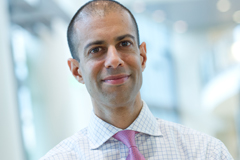 |
In the NewsMay 31, 2019The BradCastBrad FriedmanIndependent investigative journalism, broadcasting, trouble-making and muckraking with Brad Friedman of BradBlog.com, with special guest MIT nuclear proliferation expert Vipin Narang. |
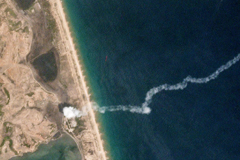 |
In the NewsMay 27, 2019North Korea has been testing ballistic missiles. So why won’t Trump use the B word?Simon DenyerThe Washington PostVipin Narang said the South Korean government may be playing “fast and loose” with semantics. “The trajectory of the KN-23 is low, so sometimes referred to as a quasi-ballistic missile, which may give them just enough semantic wiggle room to say, ‘It’s not an SRBM,’ ” he said, referring to a short-range ballistic missile. “But it is.” |
 |
In the NewsMay 25, 2019Trump appears to contradict Bolton on North Korea, expresses ‘confidence’ in KimSimon Denyer and Ashley ParkerThe Washington Post“There is a lot that is really disturbing here, but the most important bit is ‘Chairman Kim will keep his promise to me,’” Vipin Narang wrote. “Kim never promised to unilaterally disarm, and the problem is Trump continues to believe he did. THAT is why this is so dangerous.” |
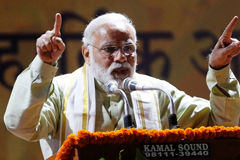 |
In the NewsMay 24, 2019Modi’s definitive win may mean a more assertive IndiaSeema ModyCNBC“Modi’s muscular national security approach just received overwhelming approval. We should expect to see more of it in the next five years,” said Vipin Narang. Narang noted that the Indian leader could use the present opportunity to “improve the defense forces and acquisition process” for his country — or he could aim to settle scores with Pakistan. |
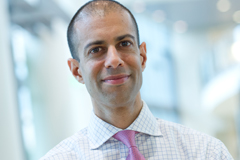 |
In the NewsMay 21, 2019Iran stance is straight from Trump's North Korea playbookJoshua BerlingerCNN“It seems very clear that at least the President's strategy is to ramp up the temperature with, and pressure on Iran, to get them to renegotiate the JCPOA, which he believes was flawed because it allowed Iran to have a (clearly regionally aggressive) foreign policy and some remnants of a defense capability (i.e. missiles) and sunset clauses on enrichment caps,” said Vipin Narang. |
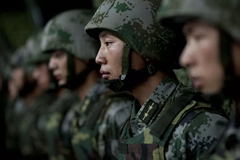 |
In the NewsMay 19, 2019“Active Defense: China’s Military Strategy Since 1949” by M Taylor FravelFrancis P SempaAsian Review of BooksIn his new and informative book Active Defense: China’s Military Strategy Since 1949, Taylor Fravel, using Communist Party history sources that have only recently become available to outside scholars, reviews the evolution of China’s military strategy since the Communist Party seized power after defeating the Nationalists in the civil war, attempts to identify, explain and categorize the changes in military doctrine, and proposes a general theory of Chinese strategic change. |
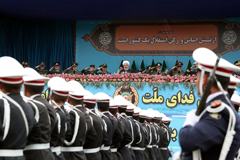 |
In the NewsMay 17, 2019To contain Iran, Trump’s newest line in the sand looks a lot like Obama’sDavid E. SangerThe New York Times“They were so committed to leaving the deal, because it had been negotiated by the Obama administration, that they did it without thinking through the predictable consequences,” said Vipin Narang. “The old agreement had flaws — many of them,” Mr. Narang said. “But by ripping it up, they opened up a Pandora’s box,” because so many in Iran also had chafed at the deal because of the nuclear production it gave away. |
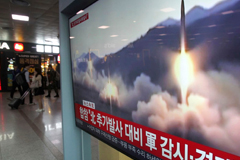 |
In the NewsMay 9, 2019North Korea launches two short-range missiles, at same time as US ICBM testSimon DenyerThe Washington PostVipin Narang, a professor of international security studies at MIT, said the risks mount with each test by the North. “Kim risks overshooting and provoking a furious Trump backlash if the latter feels betrayed,” he wrote in an email. “And if this is an attempt to pressure the U.S. to moderate its negotiating position, it may backfire: The U.S. may only harden it to avoid looking like it’s caving to North Korean tests and pressure. So, if this push-the-line strategy continues or intensifies, hold on to your hats.” |
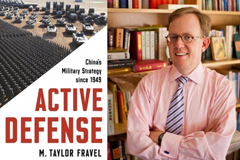 |
In the NewsMay 8, 2019The (evolving) art of warPeter DizikesMIT NewsIn his new book, “Active Defense: China's Military Strategy Since 1949,” political scientist Taylor Fravel uncovers the modern history of Chinese military strategy. |
 |
In the NewsMay 8, 2019Iran will stop complying with some parts of US nuclear dealRobin YoungWBUR Here & NowIran's president, Hassan Rouhani, said Wednesday that Tehran will stop complying with some commitments it made in the Iranian nuclear deal. Host Robin Young speaks with Here & Now security analyst Jim Walsh, with MIT's Security Studies Program. |
 |
In the NewsMay 6, 2019US risks emboldening Kim with muted response to missile testJon Herskovitz and Jihye Lee Bloomberg“Even if we internally concur with Kim that the testing moratorium only applies to ICBMs, we shouldn’t publicly say it, because it essentially says we will tolerate him testing anything short of that,” said Vipin Narang. “Tests of even those systems going forward can generate a real crisis and pose a significant threat to our allies, and our forces in the region.” |
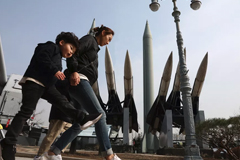 |
In the NewsMay 6, 2019North Korea tested a missile over the weekend. The Trump admin flubbed the response.Alex WardVox“Even if internally the US administration accepted that the missile-testing moratorium applied only narrowly to ICBMs, as Kim has publicly stated, don’t say it,” Narang told me. “At least stick with the vague language of ‘long-range missiles’ to cover the weapons that threaten our forces and allies in the region.” “The question will be whether this test was a one-off or whether it becomes a concerted effort to gradually escalate the range of missile tests through the end of the year to see how much Trump actually loves Kim,” he continued. |
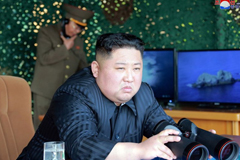 |
In the NewsMay 5, 2019North Korea weapons test may have included ballistic missileJihye LeeBloomberg“Kim Jong Un may be starting his ‘push-the-line’ strategy, gradually seeing how much Trump will turn a blind eye to,” said Vipin Narang, an associate professor of political science at MIT and a member of its security studies program. “Not good.” |
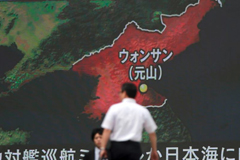 |
In the NewsMay 3, 2019Seoul: North Korea tests short-range projectilesWilliam GalloVOA NewsTesting a short-range ballistic missile “might skirt the line” on that moratorium, says Vipin Narang, a nuclear expert and professor at MIT. “Kim has stated (the moratorium) only applies to ICBMs, while the U.S. believes it applies more broadly,” Narang says. “It’s enough to signal slightly greater concern but giving the U.S. an out if it wants to, to dismiss it as not a violation of the moratorium.” |
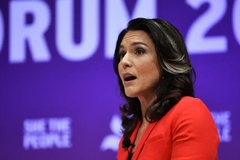 |
In the NewsMay 2, 2019Robots, war, climate: is apocalyptic rhetoric dangerous for Democratic candidates?Josh WoodThe GuardianVipin Narang, a professor of political science and a nuclear proliferation expert at MIT, says that in contrast with Gabbard’s statements, the US and the world faced a much greater threat of nuclear catastrophe during the cold war. “We probably have more flash points [today], but we traded a smaller risk of a world-ending event for maybe a larger chance of nuclear use,” he said. |
 |
In the NewsApril 27, 2019India slips further behind China during first five years of ModiIain MarlowBloombergEven Modi’s announcement of the anti-satellite missile test will be mostly useless against China, according to Vipin Narang, an MIT associate political science professor. “Not only does China have more satellites that India would likely have to kill, but China may have an advantage in killing Indian satellites,” Narang said. |
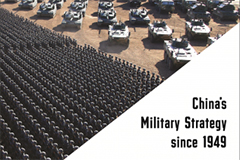 |
In the NewsApril 24, 2019“Active Defense” by Taylor FravelPrinceton University PressTaylor Fravel's newly released book illuminates the nation’s past and present military goals and how China sought to achieve them, and offers a rich set of cases for deepening the study of change in military organizations. |
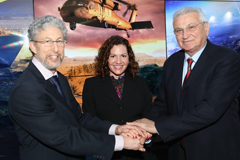 |
In the NewsApril 18, 2019MIT-Lockheed Martin Seed Fund launchesMISTI MIT NewsCollaboration between Lockheed Martin and MISTI will enable MIT faculty and students to collaborate, research, and intern in Israel, Germany, and beyond. |
 |
In the NewsApril 17, 2019MIT faculty launch collaborations around the worldMISTI MIT NewsMISTI Global Seed Funds program awards another $2 million to researchers across the Institute. |
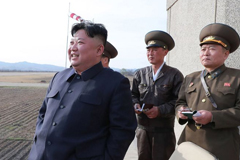 |
In the NewsApril 17, 2019North Korea test-fires new ‘tactical guided weapon,’ with Kim Jong Un there to observeVictoria KimLos Angeles Times“This seems to be a very calibrated and rational signaling attempt,” said Vipin Narang, a nuclear proliferation expert and political science professor at the Massachusetts Institute of Technology. “Kim Jong Un is trying to remind both the U.S. and South Korea what the cost of walking away from diplomacy might be…. He’s loaded his gun, but he hasn’t fired.” |
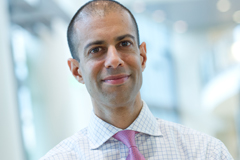 |
In the NewsApril 16, 2019The North Korean nuclear crisisDan LindleyNotre Dame International Security CenterVipin Narang is interviewed by the Notre Dame International Security Center in this podcast on North Korea's nuclear crisis. |
 |
In the NewsApril 12, 2019Trump says no to eased sanctions, but South Korea's Moon keeps nuclear talks with Kim aliveJesse JohnsonThe Japan TimesVipin Narang, a North Korea expert and professor of international relations at MIT, said this interpretation is possible, but noted that Trump’s “intuition is that a small deal cannot by definition be a ‘good deal’ ” for Trump the businessman. “My interpretation was more pessimistic than others perhaps — that he meant, ‘I’ve heard this suggestion about small step-by-step deals, but nah, I’m going to go big or go home and try to get all the nukes.’ At least for now,” Narang said. |
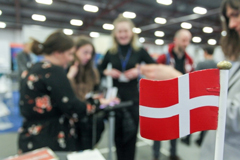 |
In the NewsApril 10, 2019Cultivating collaboration and innovation between MIT and DenmarkMIT NewsNew MIT-Denmark program is poised to send its first students overseas for internships and research. |
 |
In the NewsApril 8, 2019Increasing threats against mobile devices force HHS, others to rethink protectionsJason MillerFederal News NetworkJoel Brenner said taking your phone, laptop or other device to China was dangerous and would end up with lost data and the real possibility of having your home network compromised. “We suggested they take stripped down devices, if you are taking a device at all,” Brenner said in a recent interview with Federal News Network. “That advice was widely adopted by many companies as well as the government. I think it’s good, but tough advice to follow.” |
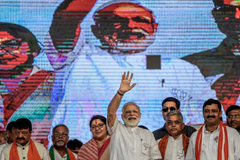 |
In the NewsApril 4, 2019Did India shoot down a Pakistani jet? US count says no.Lara Seligman Foreign PolicyAlthough the news likely won’t sway Indian voters, Vipin Narang, an associate professor of political science at MIT, said the way the events have unfolded may affect India’s efforts to deter Pakistan in the future. “As details come out, it looks worse and worse for the Indians,” Narang said. “It looks increasingly like India failed to impose significant costs on Pakistan, but lost a plane and a helicopter of its own in the process.” |
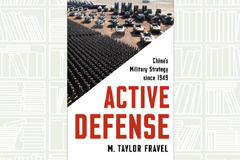 |
In the NewsApril 3, 2019What we are reading today: Active Defense: China’s Military Strategy since 1949 by M. Taylor FravelArab NewsActive Defense offers the first systematic look at China’s military strategy from the mid-20th century to today. |
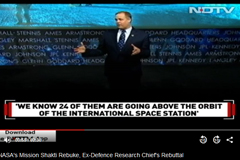 |
In the NewsApril 2, 2019To NASA's mission Shakti rebuke, ex-defence research chief's rebuttalPallava Bagla NDTVSpeaking to NDTV, Vipin Narang, a professor of political science and a specialist on strategic studies at MIT in Boston, US added, “Let's be clear there is only a 1 per cent risk of debris hitting the International Space Station, as as the NASA chief says there has been a 44 per cent increase in the risk of the ISS being hit by space junk created by the Indian A-SAT test, even then the risk goes up to a mere 1.44 per cent.” |
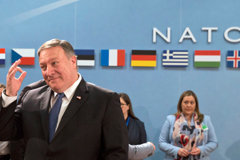 |
In the NewsApril 1, 2019NATO at 70: Is it time to overhaul one of America's oldest alliances?Meghna ChakrabartiWBURBarry Posen says President Trump might be right — and that it’s time to rethink one of America’s oldest international alliances. |
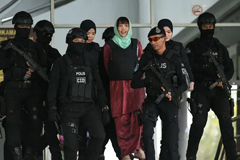 |
In the NewsApril 1, 2019How North Korea got away with the assassination of Kim Jong-namHannah Ellis-Petersen and Benjamin HaasThe Guardian“The reason to do it publicly is to leave a calling card, to show the world that Kim Jong-un is not afraid to use a weapon of mass destruction at a crowded international airport,” said Vipin Narang, a politics professor at MIT. |
 |
In the NewsMarch 28, 2019Scholar as detectiveAndrew EricksonAmerican University MagazineA gambler pulling the lever of a slot machine is not that different from a researcher elbow-deep in archival material, says Joseph Torigian (MIT ’16). |
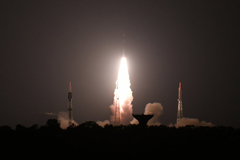 |
In the NewsMarch 27, 2019India claims successful test of anti-satellite weaponGeoff BrumfielNPRTesting a missile capable of hitting a satellite is “a hop, skip and a jump away from a ballistic missile defense test,” Narang says. |
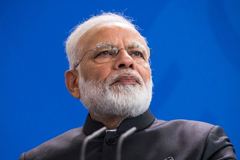 |
In the NewsMarch 27, 2019India’s anti-satellite test wasn’t really about satellitesDaniel OberhausWiredNarang says, India’s anti-satellite test is difficult to make sense of because it is “both more dependent on satellites than Pakistan and it’s also less capable in a relative sense than China.”“If Pakistan starts hitting Indian satellites, India can knock out Pakistan’s very few satellites,” notes Narang. |
 |
In the NewsMarch 27, 2019Mike Pompeo again refuses to blame Kim Jong Un for Otto Warmbier’s deathNick VisserHuffington Post“The administration is trying to square the circle between holding the regime responsible for its treatment of Otto Warmbier, but not criticize Kim directly — who they are trying to keep from testing a satellite launch vehicle, or worse, and to keep the diplomatic process from completely imploding,” Vipin Narang, an associate professor at MIT, told HuffPost. |
 |
In the NewsMarch 26, 2019Wargames and the sources of nuclear restraintReid B.C. PaulyHarvard Belfer CenterReid Pauly explains how declassified records of wargames played by US policymakers can reveal why nuclear weapons have not been used since 1945. |
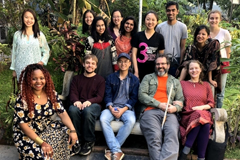 |
In the NewsMarch 25, 2019Co-designing assistive technologies in IndiaMadeline SmithMIT NewsMIT students connect with premier Indian institutes, hospitals, and students to collaborate on “humanistic” assistive design. |
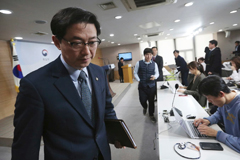 |
In the NewsMarch 22, 2019North Korea pulls out of liaison office with the South in blow to warming tiesMin Joo Kim and Simon DenyerThe Washington PostVipin Narang described the latest development as “ominous” but agreed it was more likely a pressure tactic than a sign of an irrevocable rift. “The optimistic view is it is very calibrated signaling designed to get the U.S. to move away from insisting on complete surrender up front,” he said. “The pessimistic reading, which I don’t yet share,” he added, “is that Kim has decided after Hanoi that it’s over and that he’s lost the will to negotiate further, and is now just prepping the battlefield, quite literally, for a return to hostile relations.” |
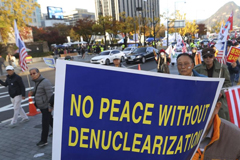 |
In the NewsMarch 21, 2019US imposes first N. Korea-linked sanctions since failed summitSteve HermanVoice of America“Insisting on unilateral North Korean disarmament upfront is pushing on the wrong door. We should be pushing to first slow the program, then cap it, and ultimately keep rollback and disarmament the long-term goal,” said Vipin Narang. “But every month that passes without a grand deal is one in which North Korea's nuclear program continues to grow larger — increasing the risk of its own use and proliferation to other countries — and the chances of a deal grow smaller.” |
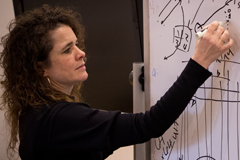 |
In the NewsMarch 19, 2019Mapping urban transportMichelle EnglishMIT NewsSarah Williams is combining her skills as a geographer, architect, data scientist, and city planner to create data for civic change. Her latest project is funded in part by the Center’s International Policy Lab. |
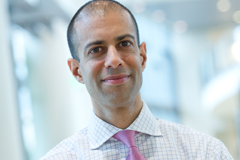 |
In the NewsMarch 19, 2019Trump officials privately bracing for North Korea's next moveKylie Atwood and Zachary CohenCNN“We may not know until it's on the stand,” according to Vipin Narang, an associate professor of political science at MIT, focusing on nuclear proliferation and strategy, who told CNN that it entirely depends on the type of engine and the payload it is carrying. |
 |
In the NewsMarch 18, 2019After the Cold War, an uncertain peacePeter DizikesMIT NewsIn a recent MIT Starr Forum, Michael McFaul, former US ambassador to Russia, explores tensions between the two countries. |
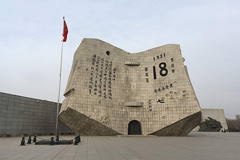 |
In the NewsMarch 14, 2019Commerce and coercionLeda ZimmermanMIT Political ScienceResponding to disputes with foreign powers, China does not speak with one voice, finds political science doctoral candidate Kacie Miura. |
 |
In the NewsMarch 12, 2019A trilogy of decency: Posen, Mearsheimer, Walt and the US grand strategyJose A Zorrilla Political InsightsAmbassador Jose A Zorrilla offers a review of Barry Posen's Restraint, as the first of three books offering comprehensive grand strategy to US foreign policy. |
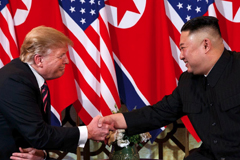 |
In the NewsMarch 11, 2019Trump’s diplomacy with Kim dims as both sides return to hard-line positionsJohn Hudson The Washington Post“If we’re going to stay firm on the maximalist position, it’s hard to see where we go from here because there’s no way Kim is going to accept this,” said Vipin Narang, a North Korea expert at the Massachusetts Institute of Technology. |
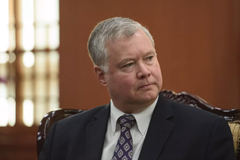 |
In the NewsMarch 11, 2019A top US diplomat just laid out the new approach to North Korea. It’s doomed.Alex WardVox“If we don’t move off this position, we have nowhere to go,” MIT nuclear expert Vipin Narang told me. “There’s no zone of agreement if we insist on everything — I mean everything, complete surrender — up front.” |
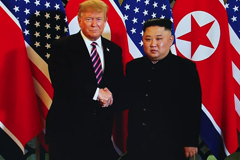 |
In the NewsMarch 8, 2019A top Trump official may have just doomed US-North Korea talksAlex WardVox“Insisting on disarmament as a condition for peace will lead to exactly the opposite of disarmament and peace,” tweeted MIT nuclear expert Vipin Narang. |
 |
In the NewsMarch 7, 2019Learning to study a painful pastPeter Dizikes MIT NewsLerna Ekmekçioğlu studies pioneering Armenian women of the 19th and 20th centuries — and helps other scholars enter her field. Her best-known book is “Recovering Armenia: The Limits of Belonging in Post-Genocide Turkey.” She is an associate professor of history at MIT and a research affiliate of CIS. |
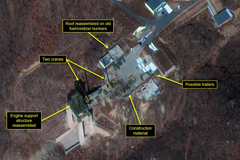 |
In the NewsMarch 7, 2019Why North Korea’s restored rocket site isn’t cause for worry — yetAlex WardVox“A satellite launch is in a gray zone but would definitely create problems for the Trump administration,” MIT nuclear expert Vipin Narang told me. “It could put us in a pickle,” especially if North Korea hardliners like National Security Adviser John Bolton use the launch to push Trump toward ending nuclear negotiations. |
 |
In the NewsMarch 7, 2019Israeli and Palestinian architects and planners seek common ground on innovation, entrepreneurshipMIT News“This program and others, like our MISTI-MEET program, are opportunities for our students to learn about entrepreneurship, science, and technology and its capacity to create positive change in the Middle East,” said MISTI assistant director David Dolev. |
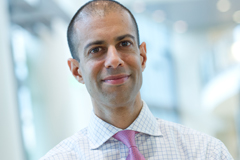 |
In the NewsMarch 6, 2019Podcast: Indo-Pak tensions; and when foreign policy matters for domestic politicsMilan VaishnavHindustan TimesMilan Vaishnav (Director of the South Asia programme at the Carnegie Endowment for International Peace) speaks with Vipin Narang, associate professor of political science at MIT and a non-resident scholar at the Carnegie Endowment for International Peace. Narang is one of the few scholars to have thought deeply about when foreign policy actually matters for domestic politics in India. |
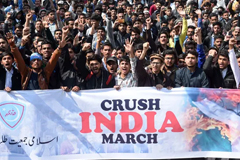 |
In the NewsMarch 5, 2019Kashmir's fog of war: how conflicting accounts benefit both sidesMichael Safi and Mehreen Zahra-Malik The Guardian“The advantage of the fog of war, especially in the immediate aftermath of something like this, is that … you can actually sustain contradictory narratives,” said Vipin Narang. And that gives both countries room to claim victory and refrain from further strikes. “This kind of ambiguity can be de-escalatory for the moment. We can litigate the facts once things settle down.” |
 |
In the NewsMarch 5, 2019Are nuclear weapons keeping the India-Pakistan crisis from escalating — or making it more dangerous?Caitlin TalmadgeThe Washington PostThis is the stuff of nuclear nightmares, especially with the U.S. government sitting on the sidelines. Worse, unlike the U.S. and U.S.S.R., India and Pakistan share a border – and their citizens may be pushing harder for escalation. |
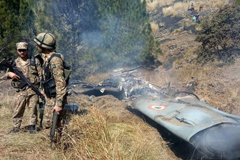 |
In the NewsMarch 1, 2019Narendra Modi v Imran Khan: Who won the war of perception?Soutik BiswasBBCAccording to Vipin Narang, professor of political science at MIT, neither side seems to want a war. He believes that they "have had their Cuban Missile Crisis moment and recognise how a couple of wrong turns could set off uncontrollable escalation". So both sides could get back to business. "Pakistan could finally crack down on terrorism and avoid getting the music started. India could continue strategic restraint," he says. |
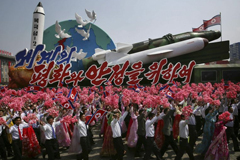 |
In the NewsMarch 1, 2019Trump-Kim talks or not, North Korea’s nuclear arsenal apparently continues to growVictoria KimLos Angeles TimesThe shutdown of Yongbyon, which includes North Korea’s only plutonium reactor as well as a uranium plant, would at least have limited the growth of North Korea’s arsenal, said Vipin Narang, a nuclear proliferation expert and political science professor at MIT. “The nuclear program continues to grow; the talks have fallen apart,” he said. “Now we’ve got nothing. This is the risk of trying to get it all in one bite.” |
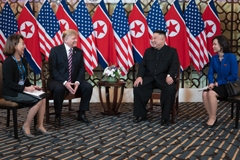 |
In the NewsFebruary 28, 2019Trump, Kim fail to reach agreement in Hanoi after talks abruptly collapseDominique Mosbergen and Nick VisserHuffington PostReacting to the “no deal” on Thursday, Vipin Narang, a professor of international relations at the Massachusetts Institute of Technology, said the Hanoi summit’s outcome was “better than a bad deal or a deal that one side may violate.” |
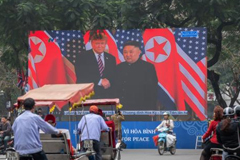 |
In the NewsFebruary 28, 2019Was Donald Trump’s North Korea summit a failure?David Brennan NewsweekVipin Narang, an associate professor of political science at MIT, argued that a nonagreement was somewhat inevitable, given the gulf between U.S. and North Korean demands. “We’ve been papering over the differences for so long, at some point the bill was going to come due,” he told Newsweek. “You could get to Hanoi by papering over the differences.” |
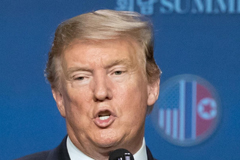 |
In the NewsFebruary 28, 2019Who left the island? Who got the rose? The Trump-Kim summit played out like a reality show.Emily TamkinThe Washington Post“Trump knows how to set up cliffhangers,” said Vipin Narang, a professor at MIT focused on nonproliferation (and, incidentally, a fan of reality programs like “Real Housewives” and “The Shahs of Sunset”). He pointed to a tweet sent out by the U.S. president in which Trump dangled the prospect of denuclearization. “They did a good job building expectations,” Narang said. |
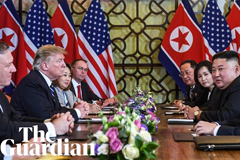 |
In the NewsFebruary 28, 2019The art of no deal: how Trump and Kim misread each otherJulian Borger The GuardianVipin Narang, an expert on nuclear proliferation from the Massachusetts Institute of Technology, said it was “better that Kim Jong-un didn’t commit to shutting down Yongbyon if he was going to slow-roll it, because committing to it in writing and then leaving himself vulnerable to being accused of violating it sets us on a collision course”. |
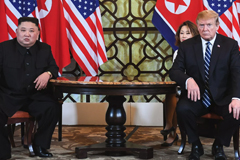 |
In the NewsFebruary 28, 20191 big thing: No deal in HanoiDave LawlerAxios WorldJim Walsh, an international security expert at MIT who has negotiated with North Korea, says the two sides “squandered their time since Singapore,” adding: “It took 2 years of intense, regular negotiation to get the Iran deal. And Iran is easier. … So no, 30 days and winging it isn’t going to get it done.” |
 |
In the NewsFebruary 27, 2019The Cybersecurity 202: CyberCom sent a message by taking down a troll farm on Election Day. Was Russia listening?Joseph MarksThe Hour“I think it was worth doing,” said Joel Brenner, a former senior counsel at the National Security Agency. “But it's likely to have a very slight deterrent effect because I don't see any penalty that's being imposed.” Brenner compared the IRA operation to police making criminals stay home and stop committing crimes for a few days rather than actually locking them up in jail. “Is that going to stop them from trying again?” he asked. |
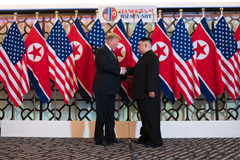 |
In the NewsFebruary 27, 2019Trump and Kim open 2nd nuclear summitPeter O'DowdWBUR Here & NowPresident Trump and North Korean leader Kim Jong Un opened their second nuclear summit Wednesday in Hanoi. The two leaders had a social dinner together with the formal meetings set for Thursday. Host Peter O'Dowd talks with Here & Now security analyst Jim Walsh, senior research associate at MIT's Security Studies Program. |
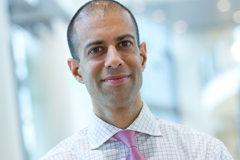 |
In the NewsFebruary 27, 2019India, Pakistan exchange fireBen WatsonDefense OneCautions Vipin Narang of MIT: “Modi overshot the upper limit of what Pakistan would take by hitting in KPK and forced Pakistan’s hand. Neither side wants a war but with this spiraling neither side wants to back down. This is getting ugly quickly. Need off-ramps and now.” |
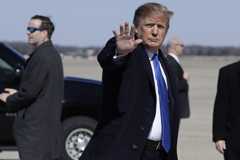 |
In the NewsFebruary 25, 2019Trump heads to Hanoi for second summit with KimSteve HermanVoice of America“All it takes is Kim pretending to disarm and Trump pretending to believe him,” says Vipin Narang. “So long as Kim doesn't embarrass Trump publicly by testing a nuclear weapon or a ballistic missile, domestically Trump can keep rinsing and repeating. The advantage for Trump is that Kim's continued expansion of his nuclear weapons program is largely silent, and, at best, shows up on page 10.” |
 |
In the NewsFebruary 25, 2019Nuclear-armed India and Pakistan face off in renewed escalationIain Marlow and Kamran Haider Bloomberg“The last time the Indian Air Force crossed the line of control intentionally and publicly to conduct air strikes was 1971,” said Vipin Narang, an associate professor of political science at MIT, referring to the Indo-Pakistan war over Bangladesh. |
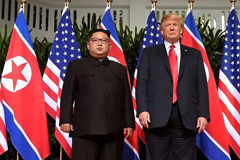 |
In the NewsFebruary 23, 2019Trump's 'great chemistry' with Kim Jong Un put to test at summitAFP/nhChannel News Asia“I think Trump is calculating that he can run out the clock at least until the end of his first term with this strategy,” said Vipin Narang, “a lot may depend on what Hanoi yields. The risk is if Kim decides this unilateral testing moratorium - because it's not in writing - no longer works for him. Then there is no diplomatic exit ramp.” |
 |
In the NewsFebruary 22, 2019Best/worst cases for Trump-Kim IIBen WatsonDefense OnePreviewing next week’s big event in Hanoi, MIT’s Vipin Narang tweeted “My reading of the last couple days’ news on the Hanoi summit is that we should expect, at best, modest progress on what are still exceedingly maximalist goals. The reverse approach—max progress on modest goals—would have been more realistic.” |
 |
In the NewsFebruary 21, 2019It’s clearer than ever that the US’s North Korea policy is in total chaosAlex WardVox“We are nowhere,” says MIT nuclear expert Vipin Narang. “Which is probably exactly where the North Koreans want us to be.” |
 |
In the NewsFebruary 20, 2019Civilians evacuated from last ISIS-held village in SyriaJeremy HobsonWBUR Here & NowA convoy of trucks carrying hundreds of civilians left the last enclave held by Islamic State militants in eastern Syria Wednesday. Jim Walsh discusses whether this signals the defeat of ISIS. |
 |
In the NewsFebruary 19, 2019Tensions are rising between India and Pakistan. But Washington doesn’t seem that bothered.Emily TamkinThe Washington Post“The response — calling on Pakistan to crack down on military organizations, the Bolton call released by both sides, the joint statement calling to crack down on terrorism — that’s all good, but we’ve done that before,” Narang said. “It’s the standard response, but, to me, it’s boilerplate.” |
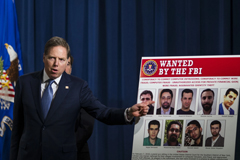 |
In the NewsFebruary 18, 2019Chinese and Iranian hackers renew their attacks on US companiesNicole PerlrothThe New York Times“If you tell the Iranians you’re going to walk out on the agreement and do everything you can to undermine their government,” said Joel Brenner, a former counterintelligence official, “you can’t be surprised if they attack our government networks.” |
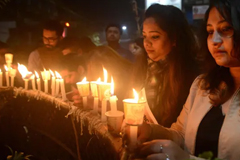 |
In the NewsFebruary 17, 2019India weighs military options against Pakistan as Kashmir tensions riseAmy Kazmin Financial Times“He is basically promising a pretty significant retaliatory strike,” said Vipin Narang, professor of political science at the MIT. “All the signs are that they are considering some sort of stand-off strike from across the LOC into Pakistani targets. The risk is that Modi miscalculates how far he can go without provoking a significant Pakistani response.” |
 |
In the NewsFebruary 15, 2019Billions dead: That's what could happen if India and Pakistan wage a nuclear warZachary KeckThe National InterestThe reason why India didn’t respond to force, according to Narang, is that—despite its alleged Cold Start doctrine—Indian leaders were unsure exactly where Pakistan’s nuclear threshold stood. That is, even if Indian leaders believed they were launching a limited attack, they couldn’t be sure that Pakistani leaders wouldn’t view it as expansive enough to justify using nuclear weapons. |
 |
In the NewsFebruary 12, 2019Trump's artificial intelligence order lacks funding but not a target — ChinaDavid IngramNBC News“Money talks when it comes to government priorities, and new money actually drives priorities.” said R. David Edelman, a former special assistant to President Barack Obama for technology policy. |
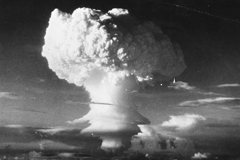 |
In the NewsFebruary 11, 2019Elizabeth Warren wants to ban the US from using nuclear weapons firstKelsey PiperVoxBut some worry that passing the bill won’t lead to the real changes — and, as a result, could actually cause harm. “A declaration, without any attendant changes to the US’s ability to actually use nuclear weapons promptly, absent changes to the actual posture, alert levels, etc. — your adversaries won’t believe it,” Vipin Narang argued. |
 |
In the NewsFebruary 8, 2019NYT: Saudi Crown Prince said he'd use 'bullet' on KhashoggiJeremy HobsonWBUR Here & NowIn 2017, Crown Prince Mohammed Bin Salman told a top aide he'd use a "bullet" on Khashoggi if he didn't return to the kingdom and stop criticizing its government, according to a New York Times report. Host Jeremy Hobson talks with Here & Now security analyst Jim Walsh. |
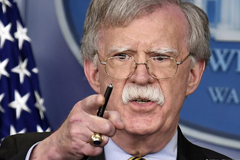 |
In the NewsFebruary 5, 2019Neocon-led US Venezuela policyMichael KniggeDeutsche WelleThere is a solid case to be made for regime change in Venezuela as advocated by the US and many of its allies. Still, scholars say, the US's record and some key Trump administration players are cause for concern. Barry Posen weighs in. |
 |
In the NewsFebruary 5, 2019Trump to meet North Korea's Kim Jong Un in Vietnam in two weeks for the pair's second summitJohn Fritze and Deirdre ShesgreenUSA Today"Ok let’s be clear that North Korea’s successful acquisition of a nuclear ICBM is why there was no war with North Korea," tweeted Vipin Narang, an associate professor of political science at MIT who studies North Korea and nuclear proliferation, in response to President's Trumps claim during the SOTU Tuesday. |
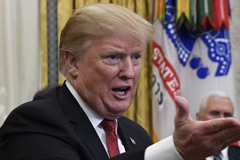 |
In the NewsFebruary 1, 2019Trump administration downplays fears of post-treaty arms raceKatie Bo WilliamsDefense One“I’m not worked up one way or another,” said Vipin Narang. “Russia has been out of compliance since 2014 and the question is how to deal with it. If you punch out, you let Russia paint you as the arms control destroyer [but] if you stay in, Russia is still going to violate it. I’m not really sure what options were left [other than withdrawal].” |
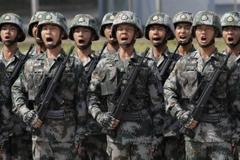 |
In the NewsJanuary 30, 2019M. Taylor Fravel on how the People's Liberation Army does military strategyAnkit PandaThe DiplomatThe Diplomat speaks with M. Taylor Fravel about how China’s People’s Liberation Army thinks about war. |
 |
In the NewsJanuary 25, 2019Trump's bizarre claims about Russian invasion of AfghanistanNECNCarol Saivetz discusses on NECN pro-Russia propaganda by President Donald Trump including claims the Soviets invaded Afghanistan to thwart terrorism. |
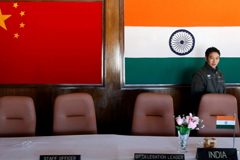 |
In the NewsJanuary 20, 2019Revolution in military affairs and India’s defense preparednessHappymon JacobThe WireVipin Narang on the new revolution in the military affairs (RMA) and its implications on global and regional strategic stability. He discusses China’s growing military capabilities and their impact on India’s defense preparedness. |
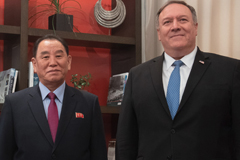 |
In the NewsJanuary 18, 2019Trump agrees to second Kim summit as nuke deal remains elusiveNick Wadhams, Margaret Talev, and Youkyung Lee Bloomberg NewsWorking-level talks between the two envoys “would be real progress,” said Vipin Narang. “We give up swinging for the fences and just get on base. The question is whether there’s enough time between now and February to hammer out the details.” |
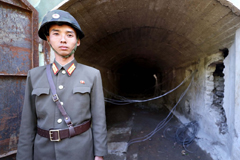 |
In the NewsJanuary 17, 2019Is the US about to lower the bar for North Korea denuclearisation?John PowerSouth China Morning Post“You could have something that talks about slowing the programme down in exchange for sanctions relief or reorientation of the American footprint, or maybe long-term suspension of large exercises with South Korea,” said Vipin Narang, referring to US troops in South Korea. “Both sides can save face then.” |
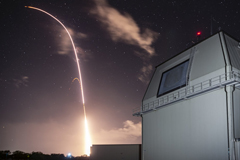 |
In the NewsJanuary 17, 2019Trump unveils ambitious missile defense plansGeoff BrumfielNPRThat adjustment could lead to an arms race, warns Vipin Narang, an arms control expert at MIT. The explicit calling out of Russian and Chinese weapons might provide a political opportunity for those nations to accelerate their programs, he argues. “This will be a gift for Putin.” |
 |
In the NewsJanuary 7, 2019What 2018 looked like fifty years agoJill LeporeThe New YorkerA book of technology predictions looked positively thrilling. This New Yorker piece credits the Center’s progenitor, Ithiel de Sola Pool, with particularly sharp insights into the future. |
 |
In the NewsJanuary 4, 2019We need to not freak out about the robot revolutionMatt SimonWiredMatt Simon, Wired, sat down with David Edelman to discuss the rise of robots, America's labor woes, and the subtleties of rotten strawberries. |


